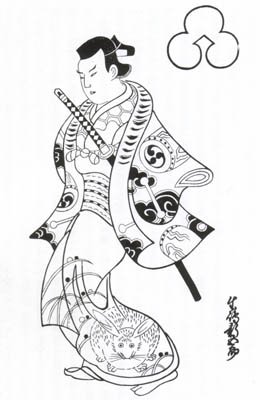| IKUSHIMA SHINGORď |
|
Stage names:
Poetry name: Ry˘ga Existence: 1671 ~ 1743 Connections: Brother: Ikushima Daikichi I Son-in-law: Mimasuya Sukejűr˘ I Grandson: Ichikawa Danjűr˘ III Disciples: Ikushima Shinnoj˘, Ikushima Shinz˘, Ikushima T˘gor˘, Ikushima T˘zabur˘, Ikushima Hanroku, Ikushima Kazuma, Ikushima Kokichi, Ikushima Kuranoj˘ Career: 1671 ~ 1682: born in ďsaka. He started his career in a troupe of children-actors (kodomo shibai), performing under the name of Noda Kuranosuke. 5th lunar month of 1682: Kuranosuke settled in Edo and played at the Ichimuraza the role of Soga Gor˘ in the drama "K˘shoku Kamakura Gonin no Onna". 8th lunar month of 1682: Kuranosuke became wakashugata and played at the Ichimuraza in the drama "Oguri Chűk˘ Guruma". 1684 (?): Noda Kuranosuke took the name of Noda Kuranoj˘. 1693: Noda Kuranoj˘ took the name of Ikushima Shingor˘. 1697: tour in Kamigata. 6th lunar month of 1699: Shingor˘ played at the Yamamuraza the role of Yamatonosuke in the drama "Isshin Onna Narukami". 1st lunar month of 1700: Shingor˘ played at the Ichimuraza the role of Nagoya Sanzabur˘ in the drama "Keisei Hama no Masago". 11th lunar month of 1700: Shingor˘ went to Ky˘to and performed at Miyako Mandayű's theater, sharing the stage with the actor Kirinami Senju I. Fall 1701: Shingor˘ went back to Edo. 11th lunar month of 1701: Shingor˘ performed at the Yamamuraza in the kaomise drama "Oguri H˘raizan". 3rd lunar month of 1702: Shingor˘ played at the Yamamuraza the role of Yamada Sabur˘ in the drama "K˘bai Sumidagawa". 11th lunar month of 1702: Shingor˘ played at the Ichimuraza the role of Takiguchi in the drama "Yorimasa H˘raizan". 11th lunar month of 1704: Shingor˘ played at the Yamamuraza the role of Yorimasa in the drama "Yorimasa Gozen N˘". 24th day of the 4th lunar month of 1706 [1]: his brother Ikushima Daikichi I died in Edo. 11th lunar month of 1706: premiere at the Yamamuraza of the drama "Taihei Shusse Kagekiyo Shiraume no Hata", which was considered as an earlier version of the Kabuki Jűhachiban drama "Kagekiyo"; Shingor˘ played the role of Chichibu no Sh˘ji Shigetada [casting]. 3rd lunar month of 1707: Shingor˘'s rank in the Edo hy˘banki, tachiyaku section, was j˘-j˘-kichi (superior - superior - excellent) [visual]. 11th lunar month of 1707: Shingor˘ played at the Yamamuraza the role of Ariwara no Yukihira in the kaomise drama "Yukihira Obana Gitsune"; his stage partners in the roles of Murasame's lovers Murasame and her sister Matsukaze were Nakamura Gentar˘ and Tsutsui Kichijűr˘. 1st lunar month of 1708: Shingor˘ played at the Yamamuraza the role of Sasaki Moritsuna in the drama "Keisei Sasaki Mond˘". 11th lunar month of 1708: Shingor˘ played at the Yamamuraza the role of Yorimasa in the kaomise drama "Yorimasa Shiki Samba". 11th lunar month of 1711: Shingor˘ played at the Yamamuraza the role of Chihara Sakon in the kaomise drama "Shida Konjiki no Uroko". 3rd lunar month of 1713: premiere at the Yamamuraza of the play "Hana Yakata Aigo Zakura", which was the first version of "Sukeroku"; Shingor˘ played the role of the sake-seller [casting]. 2nd lunar month of 1714: the love affair, which involves Ejima, a court lady who served the mother of the Sh˘gun, and Shingor˘, was discovered in the backstage of the Yamamuraza. This incident, which broke the boundaries between samurai and commoner, was a serious crime for the authorities, which decided to deal ruthlessly with the culprits: Ejima and Shingor˘ were exiled to different places, those in the Sh˘gun's household who were held responsible were executed, the Yamamuraza was definitively closed and its management was heavily fined [more details]. 13th day of the 2nd lunar month of 1742: Shingor˘ was back in Edo. 1743: Shingor˘ died in his home in the district of Kozuna-ch˘. Comments: Ikushima Shingor˘ was an outstanding tachiyaku, who achieved fame for himself in Edo during the Genroku and H˘ei era. His career was unfortunately ruined by the Shogunate rules of iron: "one of the most tragic figures among these old actors, was born in ďsaka, and came to Edo during his years of stage apprenticeship. He acted almost exclusively at the Yamamuraza. He was 44 years of age when his love affair with a lady of the Sh˘gun's Court caused him to be banished from Edo, and for twenty years he lived in his place of exile, never returning to the scene of his stage triumphs. A modern play has been made concerning this unfortunate actor, who, according to the gossip of the time, was more sought after by the venturesome Court lady than disposed to seek her himself." (ZoŰ Kincaid in "Kabuki, the Popular Stage of Japan") [1] The 24th day of the 4th lunar month of the 3rd year of the H˘ei era was the 4th of June 1706 in the western calendar. |
 |
|
Ikushima Shingor˘ |
|
|
| Contact | Main | Top | Updates | Actors | Plays | Playwrights | Programs | Links | FAQ | Glossary | Chronology | Illustrations | Prints | Characters | Derivatives | Theaters | Coming soon | News |